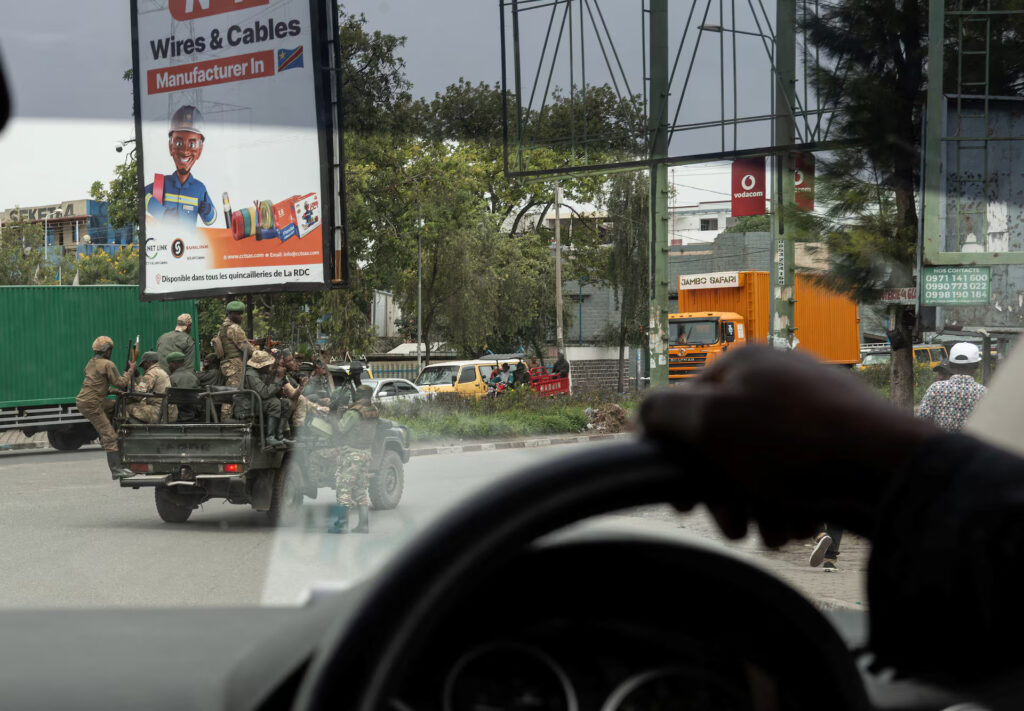Beneath the steep hills of Rubaya, thousands of men, women, and children dig by hand for coltan, the metallic ore essential to smartphones, laptops, and jet engines. The region produces about 15% of the world’s supply, but its riches are now under the control of the M23 rebel group, whose occupation has intensified both local hardship and global political tensions.
M23 seized Rubaya in April 2024, ousting pro-government militia PARECO-FF, which had held the site for two years. The United Nations accuses M23, backed by Rwanda, of taxing traders up to 15% of ore value and earning roughly $800,000 a month from the mine.
The rebels have also expanded control over key border cities Goma and Bukavu, facilitating smuggling routes into Rwanda where the ore is mixed with domestic production to conceal its origin.

M23 insurgents viewed through a car’s windshield in Goma, Democratic Republic of Congo, on March 20, 2025. The rebels seized control of the city early this year in a lightning advance. REUTERS/Zohra Bensemra
The takeover has become a central issue in parallel peace talks: U.S.-mediated negotiations between Congo and Rwanda, and separate Doha-based mediation with M23. Washington has sanctioned PARECO-FF for past smuggling but has not issued new penalties against M23, which has been under U.S. sanctions since 2013, a move some analysts see as an effort to keep talks alive.
Conditions on the ground remain precarious. While some miners report better pay and fewer bribes under M23, human rights groups warn of persistent child labor and dangerous working conditions. Reuters journalists witnessed children hauling ore from 15-meter-deep tunnels and washing it in open basins.
The stakes extend far beyond eastern Congo. Coltan’s refined form, tantalum, sells for more than $300 per kilogram, making Rubaya a potential prize for global investors. U.S. entrepreneurs, including Texas hedge fund manager Gentry Beach, have expressed interest in acquiring mining rights if peace can be secured.
President Donald Trump’s administration is pushing a “win-win” deal promising billions in investment, but over 50 U.S. lawmakers have criticized the lack of transparency and potential conflicts of interest.
U.S. President Donald Trump is flanked by Rwandan Foreign Minister Olivier Nduhungirehe (left foreground) and Congolese Foreign Minister Therese Kayikwamba Wagner (right foreground) in the Oval Office on June 27, 2025. The African countries signed a peace deal that Trump has hailed as a pathway to prosperity, but whether hostilities cease remains to be seen. REUTERS/Ken Cedeno
The path forward is uncertain. M23 has pledged to sign a peace deal with Congo by August 18, but the U.N. says the group killed at least 319 civilians in July, allegations M23 denies.
Rwandan President Paul Kagame has signaled skepticism about troop withdrawals, citing security threats from the Hutu-led FDLR militia.
As peace deadlines loom, experts warn that neither diplomacy nor investment will succeed unless control of the mines, and the profits they generate, is addressed.
For now, Rubaya’s coltan continues its journey from muddy pits to high-tech factories, its human cost hidden inside the devices that shape modern life.
Written By Rodney Mbua